The Ocean Race: What they’re saying
Published on July 16th, 2020
With the postponement of The Ocean Race from 2021 to 2022 due to the coronavirus pandemic, here is some of what’s being said about the decision:
Torben Grael, former race winning skipper and Vice-President of the World Sailing Council:
“The Ocean Race is important to me personally, and as one of the greatest events on the sailing calendar, I’m pleased to see that the organizers have taken this decision. As a sport, we benefit when our pinnacle events are at their strongest and this will allow for more well-prepared teams to be on the starting line in 2022.”
Antoine Mermod, President, IMOCA:
“The Ocean Race is the best way for IMOCA campaigns to achieve value for their sponsors, while also helping to enhance the reputation of the IMOCA Class around the world, by engaging with a more global audience. Throughout our collaboration with The Ocean Race we have always looked at what we can do together to ensure the best race possible with strong IMOCA participation. These changes, including a potential European race next summer, and an extended race calendar through 2030, are a positive step. For IMOCA campaigns there is now a schedule of confirmed ocean races every two years – one solo, one crewed – and this is the perfect balance for our sailors, sponsors and fans around the world.”
Charlie Enright, skipper, 11th Hour Racing Team:
“Given the current environment, it makes a lot of sense to postpone the race. An extra year will provide additional time for health and safety conditions to improve. The added time should also allow race organizers to work closely with the IMOCA class on the format to achieve the best possible race and maximize the entries. Our goals haven’t changed — we’re aiming to be at the start for the next edition of The Ocean Race with the strongest possible team, proving to the world that sustainability is not a compromise.”
Paulo Mirpuri, Team Principal, Mirpuri Foundation Racing Team:
“We have been in close contact with The Ocean Race to ensure the changes we are speaking about together today will have a positive impact for teams and sailors and our stakeholders. At the Mirpuri Foundation it is important to us that this race and all of our activities around it are positive and sustainable and I believe we are on the right path. We look forward to building our race team so we can return to the water stronger than ever.”
Bianca Cook, skipper, NZ Ocean Racing:
“All of us here at New Zealand Ocean Racing are grateful for more certainty with the updated plans for the next edition of The Ocean Race. For our team, the extra time will allow us to get our VO65 sailing here in New Zealand and to engage with our local communities around the country as we hold crew trials and training before returning to Europe.”
Boris Herrmann, skipper, Team Malizia:
“The Ocean Race is a truly international platform unlike any other, and we hope very much to develop a project around it. These changes are positive as it means The Ocean Race becomes a real possibility as a new challenge to take in the year following the Vendée Globe. It is a completely different kind of event, more international, fully crewed, but very interesting for me as a sailor and commercially to take to our partners.”
Event details – Route – Teams – Facebook
Here was the plan prior to postponement:
The Ocean Race 2021-22 (formerly The Volvo Ocean Race) will be raced in two classes of boats: the high-performance, foiling, IMOCA 60 class and the one-design VO65 class which has been used for the last two editions of the race. Entries in the IMOCA 60 class will compete for The Ocean Race trophy, while those racing the VO65s will chase the Ocean Challenge Trophy.
Ten Stopovers for 14th Edition:
• Alicante, Spain: This historic Mediterranean port will host the start for the fifth consecutive edition in the autumn of 2021.
• Cabo Verde: More accustomed to having offshore teams sail by, or stop for repair, this archipelago of ten volcanic islands in the central Atlantic Ocean will become just the second African venue the race has ever visited and the first West African nation to host the event. Details.
• Cape Town, South Africa: Located on the shore of Table Bay, Cape Town, as the oldest urban area in South Africa, was developed by the United East India Company (VOC) as a supply station for Dutch ships sailing to East Africa, India, and the Far East. Located at latitude 33.55° S, it’s approximately the same as Sydney and Buenos Aires and equivalent to Casablanca and Los Angeles in the northern hemisphere. Details.
• Shenzhen, China: Located in the southeast, the city is a modern metropolis that links Hong Kong to China’s mainland. It’s known for its shopping destinations and features contemporary buildings, such as the 600m-tall skyscraper Ping An International Finance Centre, and a number of amusement parks. The city is a leading global technology hub and was one of the fastest-growing cities in the world in the 1990s and the 2000s. Details.
• Auckland, New Zealand: European, Polynesian, Asian, and strong Maori heritages give Auckland its distinctive culture. Located in the North Island of New Zealand, it is the most populous urban area in the country with an urban population of around 1,570,100. Details.
• Itajaí, Brazil: To the south of Rio de Janeiro, Itajaí was founded in the mid-19th century by German and Italian colonists, and is now the commercial centre and Atlantic port for an agricultural region drained by the Itajaí River and its tributaries. Details.
• Newport, USA: Located on Aquidneck Island, Newport is 74 miles south of Boston and 180 miles northeast of New York City. It is known as a New England summer resort and is famous for its historic mansions and its rich sailing history. It was the location of every challenge to the America’s Cup between 1930 and 1983. It is also the home of Naval Station Newport, which houses the United States Naval War College, the Naval Undersea Warfare Center, and an important Navy training center. This is the third consecutive edition of the race to stop in Newport. Details.
• Aarhus, Denmark: The course comes to the east coast of the Jutland peninsula during the spring of 2022, following a popular ‘Fly-By’ of the city during the final leg of the 2017-18 edition of the Race. Details.
• The Hague, Netherlands: This city along the North Sea coast will welcome the race for a third consecutive time, first coming as a ‘pitstop’ on the final leg of the 2014-15 edition and as the final finish port for the 2017-18 race. Details.
• Genoa, Italy: As the birthplace of Christopher Columbus, this first-time race host is Italy’s largest sea port yet remains full of grandeur as the gateway to the Riviera while offering weighty architectural heritage. Details.




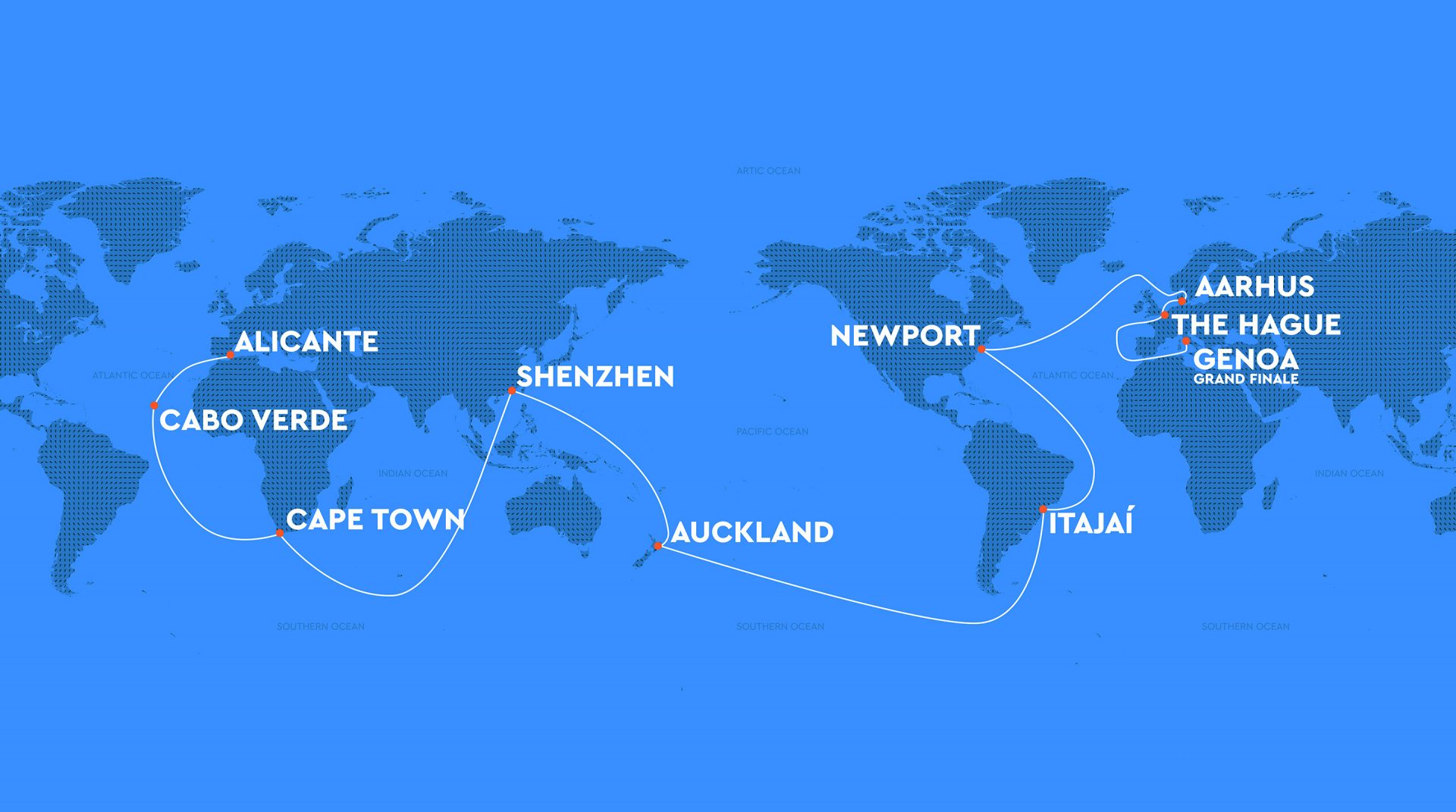

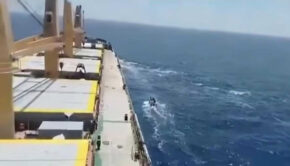
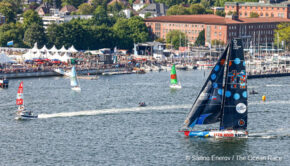
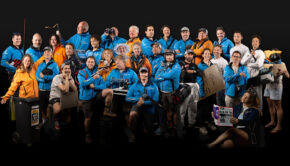
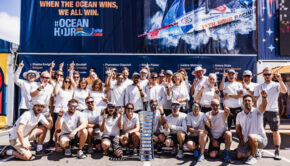
 We’ll keep your information safe.
We’ll keep your information safe.